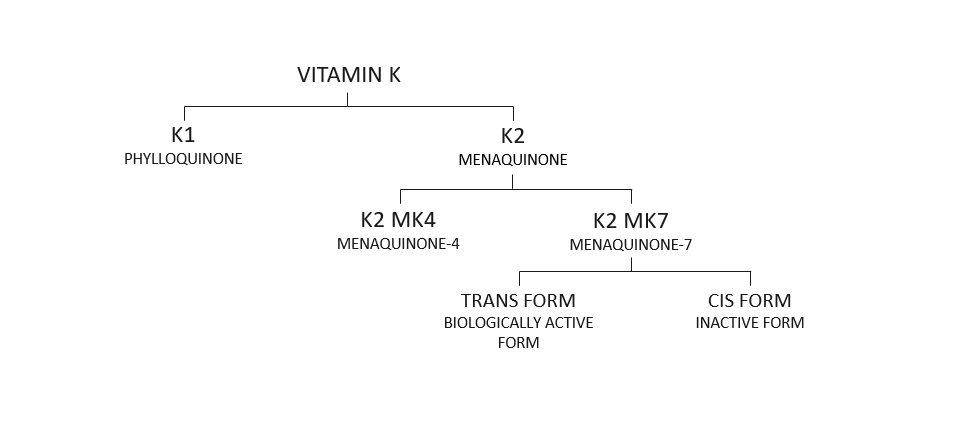One vitamin that perhaps hasn’t had its moment in the spotlight is vitamin K. This doesn’t mean that vitamin K isn’t as important as the others, it certainly is and here are a few reasons why…
What is vitamin K?
Vitamin K is a fat-soluble vitamin, meaning it dissolves in fat and requires the presence of fat to be absorbed in the body. Vitamin K can take multiple forms, including K1 and K2.
- Vitamin K1, also known as “phylloquinone” can be found in green leafy vegetables.
- Vitamin K2, also known as “menaquinone” can be found in sources such as meat, dairy and fermented foods e.g. sauerkraut and natto.1 K2 is also formed in the body when bacteria in our gut converts K1 into K2.2

To complicate matters, Vitamin K2 is also split into 2 forms, depending on the source. K2 from animal and dairy sources is known as MK4 and K2 from fermented sources is known as MK7. Often, MK7 is used in supplements as this form is retained in the body for longer and has greater metabolic action.
What does it do?
The two main functions of vitamin K in the body are:
1. Contributing to normal blood clotting
There are 13 proteins needed for the process of blood clotting and vitamin K1 is needed to produce 4 of these.3 This process is important when our bodies suffer injury to allow bleeding to stop and wounds to heal to prevent infection.
2. Contributing to the maintenance of normal bones
It is essential that we have a balance between the amount of calcium in our blood and our bones. If we have too much calcium in our blood, this can cause what we call ‘calcification’ and can lead to plaque build-up and hardening of artery walls. If we don’t have enough calcium in our bones, this can cause them to weaken, increasing the risk of breaks and conditions such as osteoporosis. Vitamin K2 is essential for the activation of the protein ‘osteocalcin’ which ensures calcium is moved out of the blood and into the bones, to help maintain bone density.1
What happens if I don’t get enough vitamin K?
One of the main possible symptoms of vitamin K deficiency is excessive bleeding however this can be displayed in a few different ways such as:
- Continually bleeding from a wound
- Bruising easily
- Passing dark stools containing blood 1
Should I be taking a vitamin K supplement?
Generally, only those who are deficient in vitamin K may need to supplement with it. The NHS recommends that we need 1 microgram of vitamin K per kilogram of bodyweight so for an individual weighing 75 kilograms, they would need 75 micrograms per day.4 Most people with a balanced diet should be able to get sufficient amounts of vitamin K1 in the diet however K2 is not as readily available in foods, with the highest amount contained in fermented goods such as natto and sauerkraut which may not be part of a typical western diet.
Anyone considering vitamin K supplementation whilst on medication should check with a clinician beforehand, as vitamin K can have possible interactions with some medications, such as anti-coagulants, for example.
Synergistic supplements
Vitamins D and K work together in the body and can play a part in both cardiovascular and bone health. Vitamin D contributes to normal blood calcium levels, ensuring we don’t have too much or too little calcium in our blood, whilst vitamin K activates proteins needed to promote calcium levels in bones and prevent calcium accumulation in blood vessels.5 Ensuring we have sufficient levels of both vitamins is important for ensuring both healthy bones and blood vessels – a win win!
References
1. Vitamin K Deficiency: Causes, Symptoms, and Treatment. Healthline. https://www.healthline.com/health/vitamin-k-deficiency. Published 2022.
2. Imbrescia K, Moszczynski Z. Vitamin K. Ncbi.nlm.nih.gov. https://www.ncbi.nlm.nih.gov/books/NBK551578/. Published 2022.
3. Vitamin K. The Nutrition Source. https://www.hsph.harvard.edu/nutritionsource/vitamin-k/#:~:text=Vitamin%20K%20helps%20to%20make%20four%20of%20the%2013%20proteins,often%20informed%20about%20vitamin%20K. Published 2022.
4. Vitamins and minerals - Vitamin K. nhs.uk. https://www.nhs.uk/conditions/vitamins-and-minerals/vitamin-k/. Published 2022.
5. Is Vitamin D Harmful Without Vitamin K?. Healthline. https://www.healthline.com/nutrition/vitamin-d-and-vitamin-k. Published 2022.

